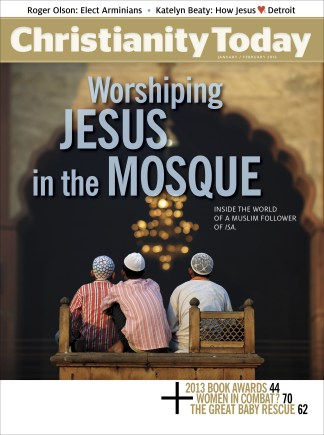In 1996 Jerry Sittser, professor of religion at Whitworth College, published A Grace Disguised, the story of his family's tragic car accident (it claimed his wife, mother, and young daughter) and the faithful manifestation of God's grace in the midst of searing pain and loss. Though writing the book was "an unpleasant task" and "did nothing to explain or justify the accident," it has helped thousands of people navigate their own grief.
Now, more than 15 years later, in A Grace Revealed: How God Redeems the Story of Your Life (Zondervan), Sittser shifts focus, inviting us to read with our own stories in mind. How, he asks, do our stories—guided and directed by the Spirit of God—intersect with the much grander, deeper story that ripples through the pages of the Bible, the story that reaches its fulfillment in Jesus Christ?
Sittser's period of grief has afforded him ample opportunity to ponder this question. How could it not? He—as do each of us—has a life story in which God's larger story of redemption has manifested itself. The car accident and its aftermath, good and bad, are but one pane in the multicolored window of Sittser's life, the stained glass that God has blown and shaped, through which the light of a much greater story shines.
Even this tragic event, he writes, "does not stand on its own or exist unto itself. It is part of a larger story. In that moment, I have no idea how; that is for me to discover in the future. For now, in the painful silence, it is enough to know there is a story out there that can make sense of my own. But it is not merely a story; it is the story."
As we surrender to Christ, God's story, the story, can envelop and transform all other stories, "however sensational or mundane, tragic or happy." Sittser sees himself "as a witness to this truth: God redeems our stories through him. If you dare to surrender yourself to God, he will take up the story of your life and integrate it into the great story of salvation, turning it into something so extraordinary that you will be tempted to think it was all a beautiful dream."
Yet understanding the relationship between our story and God's story is not an easy task. It requires a number of skills, practices, and dispositions: knowledge of the biblical story, spiritual discipline, time, prayer, discernment, wisdom, perspective, and the counsel of others. Making this task harder still is the palpable gap between the hellish chapters of our stories and the heavenly trajectory of God's. Though we know how God's story ends—resurrection, redemption, regeneration, recreation—we find ourselves living in a strange, unexpected inbetween time. Christ has yet to return, and this present evil age is still with us: We struggle with sin, we experience accidents, we grow old, we get sick, we lose loved ones, and finally we die.
But even in the midst of this evil age, we have risen to new life in Christ through the grace of God and the power of the Spirit. As Sittser puts it, we are "new in Christ," though we still grow old in a manner we were never meant to experience. It is this combination of old and new that Sittser skillfully helps us discern in our own life stories. God wants us to live a life of faith right now, even where adverse circumstances could easily produce despair. Today's wreckage may look like nothing but shattered glass. But there's a beautiful window, a conduit of God's light, well under construction.
Christopher Hall is chancellor of Eastern University and dean of Palmer Theological Seminary.











